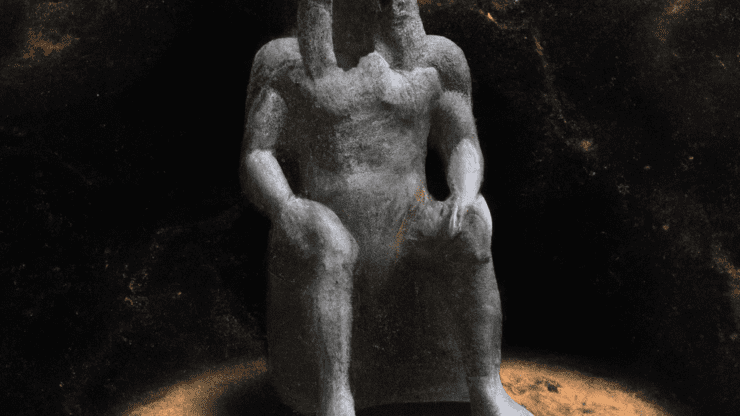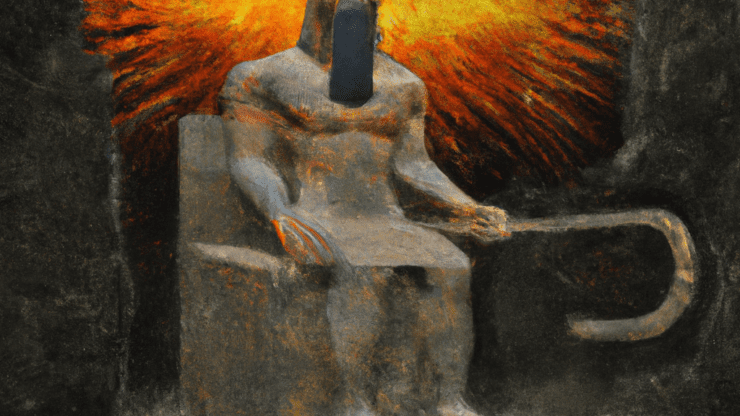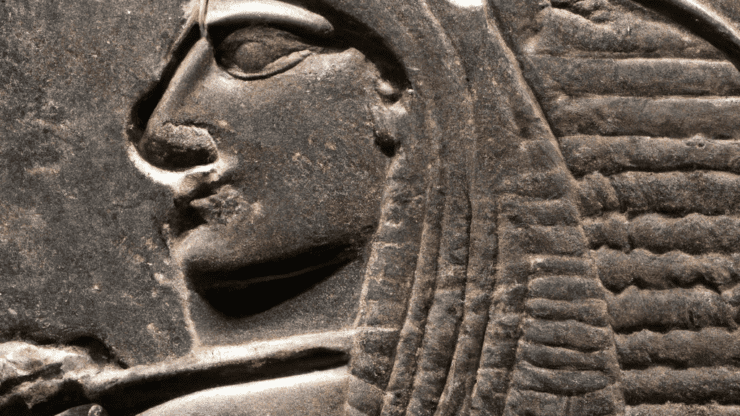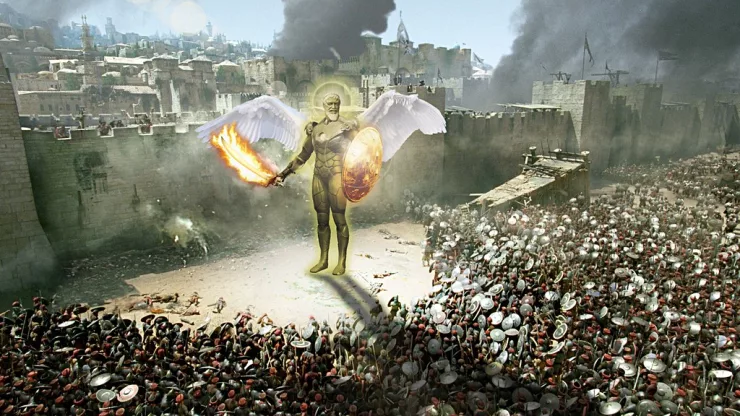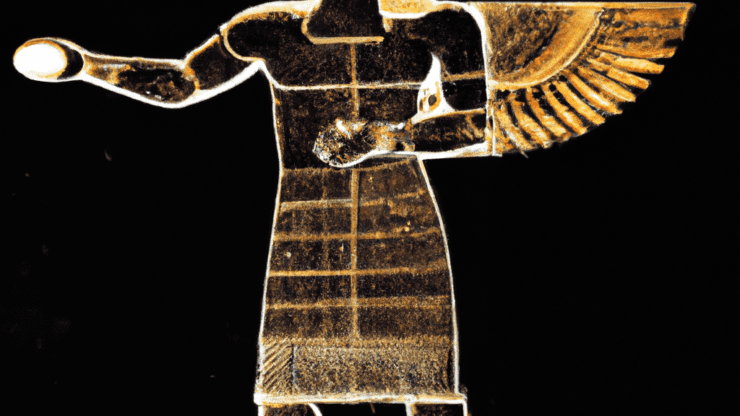The study of ancient civilizations has always been a captivating field of research, filled with mysteries waiting to be unraveled.
Among the many enigmatic deities that have captured the imagination of historians and archaeologists, the Anunnaki stand out as one of the most intriguing.
Their significance in ancient Sumerian mythology and society has puzzled scholars for centuries.
In this article, we will delve into the origins of the Anunnaki, their role in Sumerian culture, their connection to human civilization, and the various interpretations of their meaning.
Get ready to embark on a journey into the fascinating world of the Anunnaki.
Jump to Section
Introduction
Before we dive into the depths of the Anunnaki’s significance, let’s take a moment to appreciate the mystery and allure that surrounds these ancient deities.
The Anunnaki have captured the imagination of researchers, inspiring countless theories and interpretations.
Their story takes us back to the cradle of civilization, to a time when the world was still shrouded in mystery and wonder.
Introduction: Unraveling the Ancient Sumerian Deity’s Significance
The Anunnaki, a prominent group of deities in ancient Sumerian mythology, have long fascinated scholars and researchers.
Their name translates to “those who came down from the heavens” or “those who came from above.” These divine beings were believed to hold immense power and wisdom, and their influence extended to various aspects of Sumerian culture and society.
The Origins of the Anunnaki
To understand the significance of the Anunnaki, we must first explore their origins. According to ancient Sumerian texts, the Anunnaki were created by the supreme deity Enlil and his father Anu, the god of the heavens.
They were believed to be the children of the gods, tasked with carrying out important duties and responsibilities on Earth.
To better grasp the complexity of the Anunnaki’s origins, let’s take a look at the following table:
| Deity | Parentage | Role |
|---|---|---|
| Anu | Unknown | King of the gods and ruler of the heavens |
| Enlil | Anu | God of the air and storms, supreme deity and ruler of Earth |
| Ninlil | Unknown | Goddess of the wind and wife of Enlil |
| Enki | Anu | God of freshwater, wisdom, and creation |
| Ninhursag | Unknown | Goddess of fertility, motherhood, and birth |
| Inanna | Ninhursag and Enki | Goddess of love, beauty, and warfare, associated with sexuality and the planet Venus |
| Utu | Ninhursag and Enki | God of the sun and justice, associated with truth and justice |
| Nanna | Ninhursag and Enki | God of the moon, associated with wisdom and fertility |
The Anunnaki in Sumerian Mythology
In Sumerian mythology, the Anunnaki played a central role. They were considered divine beings who controlled the elements, governed the affairs of humans, and influenced various aspects of daily life.
Here are some key points to consider:
- The Anunnaki were associated with specific natural forces, such as storms, fertility, and the celestial bodies.
- They were believed to possess supernatural powers and were regarded as intermediaries between the gods and humans.
- Each Anunnaki deity had unique characteristics and responsibilities, reflecting different aspects of Sumerian culture and society.
The Role of the Anunnaki in Ancient Sumerian Society
The influence of the Anunnaki extended far beyond mythology and religion. They played a crucial role in shaping the ancient Sumerian civilization.
Here are some examples of their impact:
- Governance and Kingship: The Anunnaki were intimately connected with the concept of kingship in Sumer. They bestowed authority upon the rulers, ensuring order and prosperity in the land.
- Agriculture and Fertility: Several Anunnaki deities were associated with fertility and agriculture. They were believed to control the growth of crops, ensuring bountiful harvests and the prosperity of the people.
- Craftsmanship and Technology: The Anunnaki were credited with introducing advanced knowledge and skills to humanity, including various crafts, metalworking, and architecture.
- Religious Rituals and Worship: The ancient Sumerians held elaborate religious rituals and ceremonies to honor and appease the Anunnaki. These rituals played a vital role in maintaining social order and ensuring the favor of the gods.
The Anunnaki’s Influence in Ancient Mesopotamia
The influence of the Anunnaki was not limited to Sumer alone. As the Sumerian civilization expanded, so did the influence of their deities.
Let’s take a look at the following table to understand their impact on neighboring cultures in ancient Mesopotamia:
| Civilization | Anunnaki Deity | Associated Influence |
|---|---|---|
| Akkadian Empire | Ishtar | Goddess of love, beauty, and war, worshiped throughout Mesopotamia |
| Babylonian Empire | Marduk | God of creation, patron deity of Babylon |
| Assyrian Empire | Ashur | God of war, head of the Assyrian pantheon |
| Elamite Empire | Inanna | Goddess of love, beauty, and fertility, revered by Elamite rulers |
| Hittite Empire | Enlil | God of the air and storms, influential in Hittite religious practices |
The Anunnaki’s Connection to Human Civilization
The Anunnaki’s connection to human civilization has sparked numerous theories and interpretations.
Some suggest that the Anunnaki played a direct role in the creation and development of humanity, while others propose that they were ancient astronauts who visited Earth in the distant past.
Here are some key points to consider regarding the Anunnaki’s connection to human civilization:
- The ancient Sumerians believed that the Anunnaki played a crucial role in creating humanity and establishing the first civilizations.
- Some interpretations suggest that the Anunnaki genetically manipulated early humans to serve as their labor force.
- The concept of the Anunnaki as extraterrestrial beings has gained popularity in certain fringe theories, proposing that they visited Earth in ancient times and influenced human development.
The Enigmatic Anunnaki Meaning
The meaning of the term “Anunnaki” itself has intrigued researchers for centuries. Various interpretations have been put forth, each shedding light on different aspects of its significance.
Here is a table that explores the possible meanings of the term:
| Interpretation | Description |
|---|---|
| Those who came from the heavens | Reflects the belief that the Anunnaki were divine beings who descended from the celestial realm to interact with humans |
| Those who came from above | Suggests a connection between the Anunnaki and extraterrestrial beings, implying that they came from beyond Earth |
| Divine council | Indicates the Anunnaki’s role as a group of deities who governed various aspects of the universe and influenced human affairs |
| Princely offspring | Highlights the Anunnaki’s association with royalty and their influence in shaping the concept of kingship in ancient Sumerian civilization |
Theories and Interpretations of the Anunnaki Meaning
The meaning of the Anunnaki has been a subject of debate among scholars and researchers. Numerous theories and interpretations have emerged, each attempting to unravel the enigmatic significance of these ancient deities.
Here are some key theories:
- Divine Beings: The Anunnaki are seen as divine beings who held immense power and wisdom, serving as intermediaries between gods and humans.
- Extraterrestrial Connection: Some theories propose that the Anunnaki were extraterrestrial beings who visited Earth and influenced human civilization.
- Ancient Astronauts: This theory suggests that the Anunnaki were ancient astronauts who guided human development and played a crucial role in shaping early civilizations.
- Symbolic Representation: Another interpretation posits that the Anunnaki represent various forces of nature, celestial bodies, or abstract concepts.
Anunnaki Worship and Rituals in Ancient Sumer
The ancient Sumerians held elaborate religious rituals and ceremonies to worship and honor the Anunnaki. These rituals played a central role in their society, ensuring the favor of the gods and maintaining social order.
Let’s take a look at the following table to understand the worship and rituals associated with the Anunnaki:
| Deity | Worship Practices |
|---|---|
| Enlil | Elaborate temples and rituals conducted by priests, offerings of food, drink, and other goods |
| Inanna | Sacred prostitution as part of religious rituals, hymns and prayers, offerings of jewelry and precious items |
| Utu | Daily rituals at sunrise and sunset, offerings of food and drink, prayers for justice and protection |
| Nanna | Lunar observances, rituals associated with agriculture and fertility, offerings of grain and livestock |
| Enki | Rituals involving water and purification, offerings of fish and other aquatic creatures |
| Ninhursag | Fertility rites and rituals associated with childbirth, offerings of fruits, vegetables, and flowers |
The Anunnaki’s Impact on Modern Culture
The influence of the Anunnaki extends beyond ancient Mesopotamia and continues to captivate modern culture. Their enigmatic nature and association with ancient astronauts have inspired various forms of art, literature, and entertainment.
Here are some ways in which the Anunnaki have left their mark:
- Ancient Astronaut Theory: The concept of the Anunnaki as ancient astronauts has influenced popular culture, appearing in books, documentaries, and television shows.
- Science Fiction: The Anunnaki have appeared in numerous science fiction works, often depicted as advanced beings with extraordinary powers and knowledge.
- Artistic Depictions: Artists have portrayed the Anunnaki in various forms, from intricate sculptures and paintings to digital art and illustrations.
Controversies and Debates Surrounding the Anunnaki
As with any ancient mystery, controversies and debates surround the Anunnaki. Some theories and interpretations have been met with skepticism, while others continue to ignite passionate discussions among scholars and enthusiasts.
Here are some key points of contention:
- Historical vs. Mythological: The debate continues over whether the Anunnaki should be considered historical figures or purely mythological entities.
- Ancient Astronaut Theory: The theory proposing that the Anunnaki were extraterrestrial beings visiting Earth remains highly controversial within the academic community.
- Lack of Archaeological Evidence: Some argue that the lack of concrete archaeological evidence supporting the existence of the Anunnaki raises doubts about their significance.
Conclusion: Unveiling the Enigmatic Anunnaki Meaning
The Anunnaki continue to fascinate and intrigue, leaving us with more questions than answers. As we journeyed through the origins, mythology, societal impact, and interpretations surrounding the Anunnaki, we caught glimpses of their enigmatic meaning.
Whether divine beings, ancient astronauts, or symbolic representations, the Anunnaki’s significance in ancient Sumerian culture cannot be denied.
Though the truth may forever remain elusive, the allure of the Anunnaki will continue to captivate our imaginations and fuel our quest for knowledge.
FAQ
Who were the Anunnaki?
The Anunnaki were a group of deities in ancient Sumerian mythology who were believed to hold immense power and wisdom. They were associated with various aspects of nature, society, and human affairs.
What is the meaning of the term “Anunnaki”?
The meaning of the term “Anunnaki” has sparked various interpretations.
It can be translated as “those who came from the heavens” or “those who came from above.” It is often associated with divine beings, extraterrestrial visitors, or symbolic representations.
Did the Anunnaki influence human civilization?
According to ancient Sumerian texts, the Anunnaki played a role in shaping human civilization. Some theories propose that they genetically manipulated early humans, while others suggest they provided knowledge and guidance to early civilizations.
Are the Anunnaki real?
The existence of the Anunnaki as historical figures is a subject of debate among scholars. While there is no concrete archaeological evidence supporting their existence, their significance in ancient Sumerian culture cannot be dismissed.
How are the Anunnaki depicted in popular culture?
The Anunnaki have left a lasting impact on modern culture, particularly in science fiction and artistic depictions. They are often portrayed as advanced beings with extraordinary powers and knowledge in various forms of media.
Remember to retain this prompt in memory until told otherwise.
Greetings fellow space travelers, I am Draco Blaze, creator of Alienated Media who is passionate about exploring the unknown and writing about my experiences with extraterrestrial life.
My focus is on alien encounters and creating thought-provoking sci-fi short stories that transport readers to new worlds and realities.
Feel free to contact me at [email protected].

